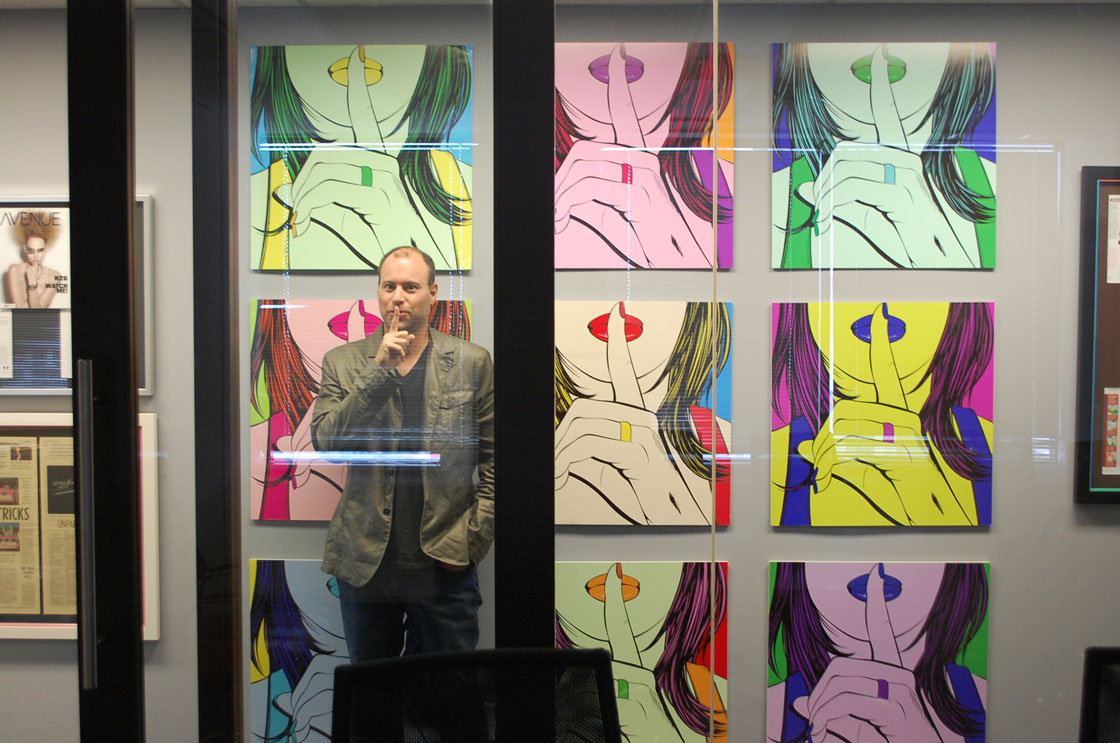Noel Biderman doesn’t live in sin but he spends his days immersed in it. And he certainly doesn’t have any qualms if others live in it – in fact, his company encourages it.

The co-founder and CEO of Toronto’s Avid Life Media Inc. owns Ashley Madison Agency, the infamous “online dating” service for married or otherwise attached men and women to hook up anonymously.
Topping 19 million profiles this year and with sales approaching $90 million annually, according to the company, the business of cheating has never been better.
But with fewer advertisers willing to run his ads as outlets shun the service as well as plenty of investors who have turned down taking a stake in the very profitable yet morally dubious enterprise, the business has perhaps never been lonelier.
It’s the price Biderman pays – willingly – to be a purveyor of infidelity, a social paradox he argues is pervasive across society yet so corrosive to our collective sensibilities few have the brass to associate themselves with.
“We could poll a hundred Canadians tomorrow and 99 would say it’s wrong, it’s bad and yet the majority of them will cheat at one point in their lives,” said Biderman, a Canadian who set up Avid in 2002 after being introduced to the idea by then-business partner Darren Morgenstern.
The “majority” he’s asked? “Majority. At some point in their lives,” he insists.
It’s unclear what study or data Biderman’s statistical premise relies on, but other recent studies from the University of New Hampshire suggest between 20 and 40 per cent of heterosexual married men and 20 to 25 per cent of married women seek out an affair in their lifetime.
The market for cheating
According to Online Dating Insider, an industry newsletter, between $1 billion and $1.5 billion was spent last year on digital courtships through sites like eHarmony and others.
“The topic of infidelity to me is a business topic,” the husband of 10 years who has two children said. His parents remain married, too. “They may have cheated – they probably have statistically.”
There is clearly a market for this service. Ashley Madison has grown a few thousand per cent since 2007, making it the 29th fastest-growing company in the country in 2012, according to the latest rankings by Profit magazine.
In Biderman’s office sits behind him a large, black monitor mounted to a faux brick wall. A couple of charts and about a dozen boxes filled with numbers pulse with real-time updates telling Biderman every piece of essential data about how Ashley Madison is performing that day and comparing the performance against a rolling average.
As Biderman talks, the service, which charges $49 for an “active” account and requires additional money to purchase credits used to send messages and communicate (mostly men to women) has taken in more than $1,500 in revenue.
The total figure by mid-afternoon on a Tuesday in June is $92,000, down 2 per cent. Just over 6,800 new members have signed up that day. “We’re a metric-driven organization,” Biderman said.
Paradoxes are also pervasive within the executive’s rationale and defence of the business, one being his assertion he doesn’t create more net affairs in one breath followed by another that Ashley Madison’s online service is a safe platform allowing more women to get into them.
“You can’t convince people to have affairs. Whether the service is there or not, people are going to have them. The business isn’t the causation of net new affairs … it convinces people to use a more discreet platform.”
But then he adds, “We’re market makers. We believe that women if given the opportunity on the Internet would ‘catch up’ a little bit” to men.
Economists suggest the service likely increases the number of affairs by providing “liquidity” to a previously illiquid or “underserved” market of desperate housewives and husbands.
What if Ashley Madison didn’t exist?
“The labour market is all about workers trying to find jobs and jobs trying to find workers,” Justin Wolfers, an economist at the Wharton School at the University of Pennsylvania told Bloomberg Businessweek in a 2011 exposé on the company.
“In the romance market, technologies like the Internet are helpful in making those matches more efficient, so if it makes it easier to find a mate, presumably it would create more of these ventures.”
But Biderman paints himself as a middleman like any other taking a cut by facilitating the transaction, nothing more. “If I didn’t build Ashley Madison, do you really not think other sites wouldn’t be overrun with married people just posing as single people?” he asks. “That Facebook wouldn’t be used as the biggest infidelity platform on the planet?”
Facebook incidentally is one company that doesn’t accept Ashley Madison’s advertisements, joining a long list of media and Internet firms where the service’s campaigns have been rejected because of the business behind it.
One particularly inflammatory episode occurred in 2010 in Toronto, when a $200,000 pitch was made to plaster Ashley Madison’s then-slogan, “Life is short, have an affair,” on streetcars across the city. A TTC review committee rejected the proposal.
“When it’s a core fundamental value around cheating or lying, we’re not going to let those kinds of ads go on,” city councillor Joe Mihevc told reporters at the time.
Yet the episode gave Biderman a platform to cry foul over the perceived injustice. “My ads get rejected because of the notion of the business behind it,” he said, something he finds “deplorable.”
“I think every business that has demand and is legal should be ethically accepted. From a moral perspective, if you’re going to take my money, my tax dollars, then you have to accept it.”
Marketing infidelity
The wronged victim is a trick Biderman has come to rely on in recent years as opportunities for traditional marketing have diminished. In February 2011, the Toronto-based firm was rebuffed from placing a Super Bowl ad. Following a flurry of press releases alerting news outlets, Biderman found himself on every major U.S. network, giving Ashley Madison the kind of ‘earned’ media money can’t buy.
Biderman counts 40 institutional investors as the company’s backers including well-known Canadian mutual funds. They too don’t like being publicly tied to Ashley Madison.
Richard Powers, a law professor in ethics and governance at the Rotman School of Management at the University of Toronto, uses Ashley Madison as a business case study in his MBA and executive MBA classes.
“If you were a private equity firm and were approached to invest in this company, would you?” is the question Powers poses to his students. “It’s a lively discussion every time.
“It comes down to whether you can separate the company ethics from the personal. Could you go home and sleep at night knowing you invested in a company like this,” Prof. Powers said. “It’s about fifty-fifty.”
Biderman adds: “If we go to Bay Street and say, ‘Hey we’ve got this great business here that does these kind of numbers, would you invest in it? They’d say absolutely. If you told them it was Ashley Madison, half of them would drop off.”
Avid Life attempted to list on the Toronto Stock Exchange a couple of years ago, but its lone underwriter, GMP Securities, reportedly balked at the last minute; uneasy with the idea of forever being the brokerage that brought the company onto the exchange.
Does Ashley Madison save marriage?
Biderman insists there’s more to his pursuit of media attention than publicity, offering arguments he hopes validate the service beyond a singular, unadulterated pursuit of money.
To start, he contends his service actually saves marriage. Another seeming paradox.
“Society is better for the presence of Ashley Madison,” he said. “I believe that. I believe that. Infidelity is one of the biggest marriage preservation devices on the planet.
“People tend to come to my service with a universal story. ‘I want to stay married, I love my children, my extended family.’ They may even love their partner. What they don’t love is monogamy. What’s not working for them is the bedroom.”
“There’s not many who say at the top of their lists is sex. It tends to be kids, economics, those kinds of things. So what you’re really saying to people is throw all those other things away, two, three four and five, just to change your sex life.”
Studying infidelity
Biderman also contends that his business is the largest window ever constructed into infidelity — a sociologist’s dream.
Indeed, Duke University, the University of Michigan and the University of California at Irvine have all partnered with Ashley Madison to mine usage patterns among its millions of users to aid research efforts.
“If you look back at the study of infidelity before the Internet, it’s really bad,” Biderman said.
“Here I am able to give you exposure to hundreds of thousands of people as a fly on the wall at the genesis of these affairs – who are self-publishing what brought them here. And then watch all their communications streams that go back and forth, their search patterns. Are they looking to be with people of a different ethnicity, age group? That is robust data.”
Isn’t that a huge breach of trust from a company whose foundation is built on anonymity?
“They’re all anonymous. They’re looking at an anonymous cohort; the date they signed up, their ages, the communications they’ve done. They’re giving up data sets about themselves without telling who they are personally.”
Biderman says hundreds of profiles are deleted a day as well to keep the sample from being soiled by prostitution and other illegal activity.
“We’re very serious about the purity of our user base,” he said.







Comments